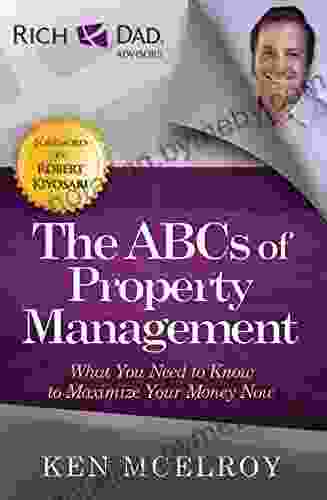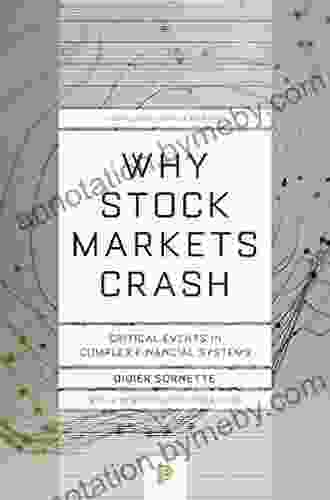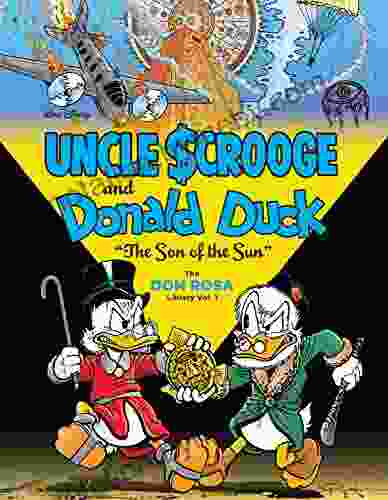Why Stock Markets Crash: An In-Depth Exploration

Stock market crashes, often characterized by rapid and significant declines in stock prices, have been a recurring phenomenon throughout history, leaving a profound impact on economies, individuals, and societies. Understanding the intricate mechanisms that trigger these crashes is essential for investors, financial professionals, and anyone seeking to navigate the complexities of the financial landscape.
4.3 out of 5
| Language | : | English |
| File size | : | 14536 KB |
| Text-to-Speech | : | Enabled |
| Screen Reader | : | Supported |
| Enhanced typesetting | : | Enabled |
| Word Wise | : | Enabled |
| Print length | : | 444 pages |
Causes of Stock Market Crashes
Economic Bubbles
Economic bubbles, fueled by excessive optimism and speculation, can lead to unsustainable asset price inflation. When these bubbles burst, a sharp correction can occur, triggering a market crash. The dot-com bubble of the late 1990s and the housing bubble of the mid-2000s are prime examples.
Financial Panics
Financial panics, characterized by widespread fear and loss of confidence, can create a self-fulfilling prophecy. As investors rush to sell their assets, prices plummet, exacerbating the decline and potentially leading to a market crash. The Panic of 1907 and the Black Monday crash of 1987 are historical examples of financial panics.
External Shocks
External shocks, such as geopolitical crises, natural disasters, or technological disruptions, can trigger market sell-offs and lead to crashes. The assassination of Archduke Franz Ferdinand in 1914, which sparked World War I, is a classic example of an external shock that led to a market crash.
Consequences of Stock Market Crashes
Economic Downturns
Stock market crashes can have severe implications for the broader economy. Declining stock prices reduce household wealth, dampen consumer spending, and can lead to corporate bankruptcies and job losses, ultimately triggering economic downturns.
Financial Instability
Market crashes can destabilize financial systems, particularly if they expose underlying vulnerabilities. Panic selling can lead to liquidity crises and disrupt financial markets, impairing the flow of capital and economic transactions.
Loss of Confidence
Crashes can erode investor confidence and create a negative feedback loop. Fear and uncertainty can drive investors to sell their assets, exacerbating the decline and further undermining confidence.
Prevention Strategies
Regulation and Supervision
Robust regulations and effective supervision can help mitigate the risks of stock market crashes. Regulators can impose measures to prevent excessive leverage, promote transparency, and enhance disclosure requirements.
Central Bank Intervention
Central banks can play a vital role in stabilizing markets during crises. By providing liquidity, lowering interest rates, or implementing quantitative easing measures, central banks can ease financial strains and prevent a downward spiral.
Investor Education
Educating investors about market risks and promoting financial literacy can help prevent panic selling and excessive speculation. Investors should understand the potential for volatility and diversify their portfolios to mitigate risks.
Stock market crashes are a complex phenomenon with multifaceted causes and severe consequences. Understanding these factors is crucial for policymakers, financial professionals, and investors alike. By adopting proactive prevention strategies and fostering a culture of financial literacy, we can enhance market resilience and mitigate the risks associated with market crashes.
Disclaimer: The information presented in this article is for informational purposes only and should not be construed as financial advice.
4.3 out of 5
| Language | : | English |
| File size | : | 14536 KB |
| Text-to-Speech | : | Enabled |
| Screen Reader | : | Supported |
| Enhanced typesetting | : | Enabled |
| Word Wise | : | Enabled |
| Print length | : | 444 pages |
Do you want to contribute by writing guest posts on this blog?
Please contact us and send us a resume of previous articles that you have written.
 Book
Book Novel
Novel Page
Page Chapter
Chapter Text
Text Story
Story Genre
Genre Reader
Reader Library
Library Paperback
Paperback E-book
E-book Magazine
Magazine Newspaper
Newspaper Paragraph
Paragraph Sentence
Sentence Bookmark
Bookmark Shelf
Shelf Glossary
Glossary Bibliography
Bibliography Foreword
Foreword Preface
Preface Synopsis
Synopsis Annotation
Annotation Footnote
Footnote Manuscript
Manuscript Scroll
Scroll Codex
Codex Tome
Tome Bestseller
Bestseller Classics
Classics Library card
Library card Narrative
Narrative Biography
Biography Autobiography
Autobiography Memoir
Memoir Reference
Reference Encyclopedia
Encyclopedia Emma Gift
Emma Gift Karen Blumenthal
Karen Blumenthal Rachel Kowert
Rachel Kowert Deirdre Pitney
Deirdre Pitney Robert Schwarztrauber
Robert Schwarztrauber Jaed Coffin
Jaed Coffin Janet Wallach
Janet Wallach Dizzy Davidson
Dizzy Davidson Julie Flett
Julie Flett Leonard Carson Lambert
Leonard Carson Lambert Eric Normand
Eric Normand Kent Anderson Leslie
Kent Anderson Leslie Dharma Singh Khalsa
Dharma Singh Khalsa Kristin Briney
Kristin Briney John O Sullivan
John O Sullivan Linda Sarris
Linda Sarris Peter Moore
Peter Moore Dom Amore
Dom Amore Frank J Fabozzi
Frank J Fabozzi Diet Eman
Diet Eman
Light bulbAdvertise smarter! Our strategic ad space ensures maximum exposure. Reserve your spot today!

 Rudyard KiplingIsabella of Castile: Unveiling the Extraordinary Life of Europe's First Great...
Rudyard KiplingIsabella of Castile: Unveiling the Extraordinary Life of Europe's First Great... Wayne CarterFollow ·5.8k
Wayne CarterFollow ·5.8k Hudson HayesFollow ·13.5k
Hudson HayesFollow ·13.5k Jacob HayesFollow ·13.8k
Jacob HayesFollow ·13.8k Yukio MishimaFollow ·6.4k
Yukio MishimaFollow ·6.4k Austin FordFollow ·4.2k
Austin FordFollow ·4.2k Justin BellFollow ·7k
Justin BellFollow ·7k George OrwellFollow ·7.2k
George OrwellFollow ·7.2k Patrick HayesFollow ·11.4k
Patrick HayesFollow ·11.4k

 Cruz Simmons
Cruz SimmonsGuide To Pencak Silat Kuntao And Traditional Weapons:...
Immerse yourself in the captivating world of...

 Dalton Foster
Dalton FosterUnlock Your Financial Freedom: Dive into the ABCs of Real...
Are you ready to embark on a...

 George Orwell
George OrwellThe Advanced Guide to Real Estate Investing: Your...
Are you ready to embark on...

 Will Ward
Will WardMargaret Laurence: The Making of a Writer
Margaret Laurence (1926-1987) was one of...

 Jorge Amado
Jorge AmadoThe ABCs of Property Management: A Comprehensive Guide...
Owning and managing rental...
4.3 out of 5
| Language | : | English |
| File size | : | 14536 KB |
| Text-to-Speech | : | Enabled |
| Screen Reader | : | Supported |
| Enhanced typesetting | : | Enabled |
| Word Wise | : | Enabled |
| Print length | : | 444 pages |












